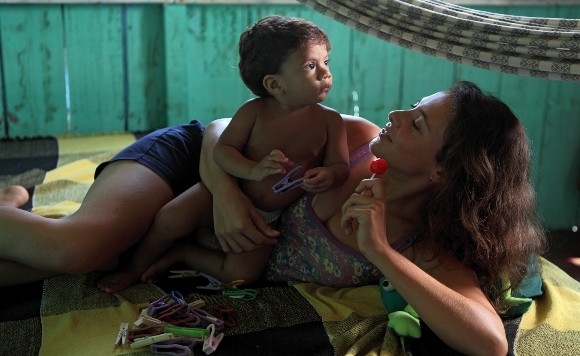 JASMINE TRINCA IN THERE WILL COME A DAYArtful "Eat Play Love," Italian style
JASMINE TRINCA IN THERE WILL COME A DAYArtful "Eat Play Love," Italian styleGiorgio Diritti's previous film, his sophomore effort, told a wartime story of a German massacre of Italian peasants.
The Man Who Will Come/L'uomo che verra (SFIFF 2010) used authentic locals from the Appenine mountains near Bologna talking in impenetrable dialect. And again in this new more ambitious effort set in the present and largely filmed in Brazil Diritti makes much use of documentary material and a meandering non-structure.
The Man Who Will Come won the Grand Jury Prize at Rome in 2009 despite a lack of narrative drive. I frankly find Diritti's style in both films original, but showy, self-indulgent and aimless; others are entranced and see this new film as a beautiful meditation and a visual poem depicting a profound spiritual and human journey. It does contain some very interesting footage. But it seems to me ultimately much too pretentious and full of itself.
What we can all agree on is that Diritti's one constant point of reference, apart from the authentic Amazon locations and indigenous people, is the beautiful young Italian woman, Augusta (Jasmine Trinca), who's running from a trauma. She's recently lost a child and learned she can't have another and at the news her husband has chosen to leave her. (Rumor has it that Diritti is basing this film partly on a previous journey here in flight from a trauma of his own, when he shot a documentary.)
Augusta's mother Anna (Anne Alvaro) in Bologna has apparently arranged for her to join an old friend of hers, a Catholic nun, Suor Franca (Pia Engleberth), who travels, gives medical help, and teachers. For a while, in a succession of authentic scenes, we see Augusta and the no-nonsense sister cruise the Amazon in a boat visiting and helping the Indios. But the liaison of the two women doesn't last. Augusta likes helping the Indios, but sees no point in inculcating in them as Suor Franca does Christian doctrines like sin and the divinity of Jesus. Besides, there are other problems. Evangelicals are driving the Catholics out, while the Catholics, including Suor Franca, are hand-in-glove with hotel developers who blatantly exploit the indigenous people for their own commercial ends. Another issue that will come up later is that there is a traffic in children, who disappear when they're sold for foreigners to adopt them.
I find Augusta selfish, and this film a more highfalutin, art house Italian version of
Eat Play Love. Augusta isn't doing a job, however in part dubious, like Suor Franca. She's finding herself.
Leaving Suor Franca and rarely bothering to communicate with her concerned mamma back in Italy, Augusta winds up with a family in a favela in Manaus, the capital city of the state of Amazonas,whose inhabitants live in houses on stilts over stagnant water. Again Diritti provides much documentary detail using non-actors but has little use for narrative. This film moves by bits of information rather than events and jumps between Italy and Brazil with a maddening casualness that others take as a poetic meditation heightened by Jasmine Trinca's pretty, inward-looking face. In many ways this is another
Eat Pray Love, but the taciturn Jasmine Trinca is no Julia Roberts, and doesn't do much eating or praying. She does read a book by the French Christian mystic Simone Weil (this is a French-Italian co-production).
With the extended family in Manaus, which seems to have no trouble taking her in, Augusta is happy, and they treat her like a cross between a sister and a princess. She attaches herself to pretty young mother Janaina (Amanda Fonseca Galvao), and her heart seems to flutter for the chubby, naive João (Paulo De Souza), the young breadwinner, who has a brilliant smile and stylish hair. The conversations often seem improvised, not scripted, though the scenario is attributed to Giorgio Diritti, Fredo Valla, and Tania Pedroni. The sometimes gorgeous cinematography is by Roberto Cimatti. The Manaus sequence, which has much sociological as well as emotional content, is more original than the earlier material. But it oscillates between interesting and merely aimless. At some point the film begins to feel bloated, even though it has accomplished a lot in the first fifty minutes, and in Manaus there is amazing footage of the start of the rainy season. Meanwhile we still have to deal with constant suddenly recurrent short scenes of Augusta's sad-sack mamma back in Italy, who's caring for
her mother (Sonia Gessner). And then a predictable tragedy happens to Janaina, leading to more and more back-and-forth cutting.
Un giorno devi andare/A Day Will Come (literally "One day you must go"), 109 mins., debuted at Sundance Jan. 2013, opened theatrically in Italy in March; Karlovy, Vancouver, Chicago festivals. Screened for this review as part of the San Francisco Film Society's New Italian Cinema series, Nov. 14 at the series venue, Landmark's Clay Theatre at 2261 Fillmore St.





